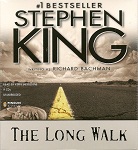
 THE CHALLENGE:
THE CHALLENGE:
This is our 5th Annual SFFaudio Challenge. Every November 11th, for the last five years, we’ve offered the following challenge to SFFaudio readers:
“We’ll give you an audiobook if you make one for everyone else.”
That deal still holds. We’ll give you an audiobook if you make make an audiobook out of one of the etexts we suggest. All you’ll need to do is claim a title (by email), record the audiobook, using your own human voice (sorry no robots), and follow the rules (see the first comment of this post for the rules).
Still feeling a little unclear on how it all works? Then have a look at our past SFFaudio CHALLENGES:
|OUR FIRST CHALLENGE|
|OUR SECOND CHALLENGE|
|OUR THIRD CHALLENGE|
|OUR FOURTH CHALLENGE|
This year we’ve got 12 ebooks that need turning into audiobooks and we’ve got 12 BRAND NEW audiobooks to give away as prizes! No matter where you are on the planet Earth, if you finish and release your claimed audiobook, we will ship you your prize!
Interested?
If so, THE FIRST THING you need to do is PICK ONE OF THESE ebooks…
CHALLENGE TITLES:
____________
The Judas Valley
By Randall Garrett and Robert Silverberg
LENGTH: NOVELETTE
NOTES: Published under a pseudonym. First published in the October 1956 issue of Amazing Stories. “Why did everybody step off the ship in this strange valley and promptly drop dead? How could a well-equipped corps of tough spacemen become a field of rotting skeletons in this quiet world of peace and contentment? It was a mystery Peter and Sherri had to solve. If they could live long enough!”
SOURCE: Gutenberg.org |HTML|
STATUS: CLAIMED BY Mark F (in British Columbia) on NOV. 12, 2010
____________
I.Q.
By Mack Reynolds
LENGTH: SHORT STORY
NOTES: First published in the June 1961 issue of Fantastic Stories Of Imagination. “In a time when teaching machines and batteries of educational tests seem to be determining the intellectual nobility of the next generation, this story has meaning for all of us.”
SOURCE: Archive.org |HTML|
STATUS: CLAIMED BY Rick McCallion (in Richmond, British Columbia) on NOV. 16, 2010
____________
Mercenary
By Mack Reynolds
LENGTH: NOVELLA
NOTES: First published in the April 1962 of Analog. Later expanded into the novel Mercenary From Tomorrow. “Every status-quo-caste society in history has left open two roads to rise above your caste: The Priest and The Warrior. But in a society of TV and tranquilizers—the Warrior acquires a strange new meaning.”
SOURCE: Gutenberg.org |HTML|
STATUS: CLAIMED BY Charles Beard (in an undisclosed location) on January 28, 2011
____________
Black Man’s Burden
By Mack Reynolds
LENGTH: NOVEL
NOTES: First published in the December 1961 and January 1962 issues of Analog Science Fact & Fiction. The turmoil in Africa is only beginning—and it must grow worse before it’s better. Not until the people of Africa know they are Africans—not warring tribesmen—will there be peace.
SOURCE: Gutenberg.org |HTML|
STATUS: UNCLAIMED
____________
Border, Breed Nor Birth
By Mack Reynolds
LENGTH: NOVEL
NOTES: First published in the July and August 1962 issues of Analog Science Fact & Fiction. Later published as one half of an Ace double novel. The second book in a series following Black Man’s Burden. “A novel of colonialism set in North Africa.”
SOURCE: Gutenberg.org |HTML|
STATUS: CLAIMED BY Alden Zwerling (in Florida) on June 24, 2011
____________
It’s A Small World
By Robert Bloch
LENGTH: NOVELETTE
NOTES: “For two tiny, bewildered people, it was a struggle tor survival in a world of toys.” First published in the March 1994 issue of Amazing Stories. “There were dreadful juggernauts of death and destruction beneath this gaily decorated Christmas tree!”
SOURCE: Archive.org |HTML|
STATUS: CLAIMED BY Tina Fields on February 18, 2011
____________
The Big Time
By Fritz Leiber
LENGTH: NOVELLA
NOTES: Needs a female narrator. First published in the March and April 1958 issues of Galaxy Magazine. In 1961 it was collected as a half of Ace Double #D491. There is already a commercial version available from Audible.com and Brilliance Audio |READ OUR REVIEW|
SOURCE: Gutenberg.org |HTML|
STATUS: CLAIMED BY Karen Savage on January 13, 2011 COMPLETED September 16, 2011!
____________
The Most Dangerous Game (aka “The Hounds of Zaroff“)
By Richard Connell
LENGTH: NOVELETTE
NOTES: Made into a movie of the same name. Extensively written about |HERE|. First published in the January 19, 1924 issue of Collier’s Weekly.
SOURCE: fiction.eserver.org |HTML|
STATUS: CLAIMED BY Matthew Molberg on December 31, 2010
____________
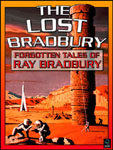 Defense Mech
Defense Mech
By Ray Bradbury
LENGTH: SHORT STORY
NOTES: A “humorous” story of psychology. First published in the Spring 1946 issue of Planet Stories
SOURCE: Courtesy of Wonder Ebooks (from The Lost Bradbury). |PDF| or |EPUB|
STATUS: CLAIMED BY Ed Good on NOV. 14, 2010
____________
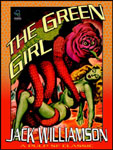 The Green Girl
The Green Girl
By Jack Williamson
LENGTH: NOVEL
NOTES: “Early sense of wonder SF.” First published in the March and April 1930 issues of Amazing Stories. Later collected in 1950 as Avon Fantasy Novel #2. “Melvin Dane has been seeing a vision of a green girl since he was a child. Images of her came over the ether. Is she just fantasy? Or a reality that managed to cross time and space? And now, with the Earth under threat of extinction, will Melvin ever meet that girl of his dreams?”
SOURCE: Courtesy of the Wonder Ebooks edition. |PDF| or |EPUB|
STATUS: CLAIMED BY Julie Davis of Texas on NOV. 16, 2010 COMPLETED August 25, 2011, Available at Forgotten Classics and HERE.
____________
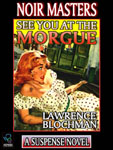 See You At The Morgue
See You At The Morgue
By Lawrence Blochman
LENGTH: NOVEL
NOTES: “A pseudo classic.” First published in 1941, later reprinted as a Penguin paperback and a Dell mapback. “When a gigolo is shot, to death in the bedroom of a beautiful girl, it raises some perplexing problems for Detective Kenny Kilkenny. Why, for example, would a man steal the license plates off his own car? Why should an innocent young professor come to the murder room … and then conceal a key to the crime? Why was a ‘phantom secretary’ hiding in the closet near the murdered man? Was there really money to be made selling glass eyes for stuffed ducks? Why would a beautiful girl ask her lover to kill her?”
SOURCE: Courtesy of the Wonder Ebooks edition. |PDF| or |EPUB|
STATUS: CLAIMED BY Mark Douglas Nelson on NOV. 11, 2010 COMPLETED August 14, 2011, Available at Podiobooks.com
____________
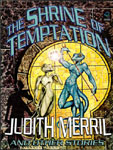 Daughters Of Earth
Daughters Of Earth
By Judith Merrill
LENGTH: NOVELLA
NOTES: Must have a female narrator. “The Shrine Of Temptation had a great impact on the development of science fiction at the time that it was published. Through its vivid narratives and powerful prose, it tells of a young Islander child, who through his innocence and luck, has become instrumental in the Rebirth of his village.”
SOURCE: Courtesy of Wonder Ebooks collection Shrine Of Temptation And Other Stories. |PDF| or |EPUB|
STATUS: CLAIMED BY Elizabeth Lawrence on NOV. 27th, 2010
PRIZES:
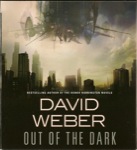 Out Of The Dark
Out Of The Dark
By David Weber; Read by Charles Keating
15 CDs – Approx. 18 Hours [UNABRIDGED]
Publisher: Macmillan Audio
Published: September 2010
ISBN: 9781427210616
Earth is conquered. The Shongairi have arrived in force, and humanity’s cities lie in radioactive ruins. In mere minutes, over half the human race has died. Now Master Sergeant Stephen Buchevsky, who thought he was being rotated home from his latest tour in Afghanistan, finds himself instead prowling the back country of the Balkans, dodging alien patrols and trying to organize the scattered survivors without getting killed. His chances look bleak. The aliens have definitely underestimated human tenacity—but no amount of heroism can endlessly hold off overwhelming force. Then, emerging from the mountains and forests of Eastern Europe, new allies present themselves to the ragtag human resistance. Predators, creatures of the night, human in form but inhumanly strong. Long Enemies of humanity…until now. Because now is the time to defend Earth.
 Kirinyaga: A Fable of Utopia
Kirinyaga: A Fable of Utopia
By Mike Resnick; Read by Paul Michael Garcia
8 CDs or 1 MP3 CD – 10 hours – [UNABRIDGED]
Publisher: Blackstone Audio
Published: 2006
ISBN: 9780786167906
|READ OUR REVIEW|
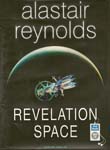 Revelation Space
Revelation Space
By Alastair Reynolds; Read by John Lee
2 MP3-CDs – 22 hours – [UNABRIDGED]
Publisher: Tantor Media
Published: 2009
ISBN: 9781400159550
| MP3 Audio Sample |
Nine hundred thousand years ago, something annihilated the Amarantin civilization just as it was on the verge of discovering space flight. Now one scientist, Dan Sylveste, will stop at nothing to solve the Amarantin riddle before ancient history repeats itself. With no other resources at his disposal, Sylveste forges a dangerous alliance with the cyborg crew of the starship Nostalgia for Infinity. But as he closes in on the secret, a killer closes in on him because the Amarantin were destroyed for a reason. And if that reason is uncovered, the universe—and reality itself—could be irrevocably altered.
 The Shadow of Saganami
The Shadow of Saganami
By David Weber; Read by Jay Snyder
26 CDs – 31 Hours – [UNABRIDGED]
Publisher: Brilliance Audio
Published: 2009
ISBN: 9781423395386
The Star Kingdom of Manticore is once again at war with the Republic of Haven after a stunning sneak attack. The graduating class from Saganami Island, the Royal Manticoran Navy’s academy, are going straight from the classroom to the blazing reality of all-out war — except for the midshipmen assigned to the heavy cruiser HMS Hexapuma, that is. They’re being assigned to the Talbott Cluster, a backwater far from the battle front. With a captain who may have seen too much of war and a station commander who isn’t precisely noted for his brilliant and insightful command style, it isn’t exactly what the students of Honor Harrington expected. But things aren’t as simple — or tranquil — as they appear. Pirates, terrorists, genetic slavers, smuggled weapons, long-standing personal hatreds, and a vicious alliance of corporate greed, bureaucratic arrogance, and a corrupt local star nation with a powerful fleet, are all coming together, and only Hexapuma, her war-weary captain, and Honor Harrington’s students stand in the path. They have only one thing to support and guide them: the tradition of Saganami. The tradition that sometimes a Queen’s officer’s duty is to face impossible odds . . . and die fighting.
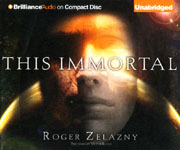 This Immortal
This Immortal
By Roger Zelazny; Read by Victor Bevine
6 CDs – Approx. 6 Hours 29 Minutes [UNABRIDGED]
Publisher: Brilliance Audio
Published: August 25, 2010
ISBN: 1441875018
Sample: |MP3|
Conrad Nomikos has a long, rich personal history that he’d rather not talk about. And, as arts commissioner, he’s been given a job he’d rather not do. Escorting an alien grandee on a guided tour of the shattered remains of Earth is not something he relishes – especially since it is apparent that this places him at the center of high-level intrigue that has some bearing on the future of Earth itself. But Conrad is a very special guy…
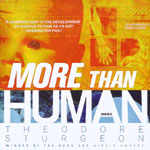 More Than Human
More Than Human
By Theodore Sturgeon; Read by Stefan Rudnicki and Harlan Ellison
7 CDs or 1 MP3-CD – Approx. 8 Hours [UNABRIDGED]
Publisher: Blackstone Audio
Published: June 2010
ISBN: 9781433275111 (cd), 9781433275142 (mp3-cd)
In this genre-bending novel, among the first to have launched science fiction into literature, a group of remarkable social outcasts band together for survival and discover that their combined powers render them superhuman. There’s Lone, the simpleton who can hear other people’s thoughts; Janie, who moves things without touching them; and the teleporting twins, who can travel ten feet or ten miles. There’s Baby, who invented an antigravity engine while still in the cradle, and Gerry, who has everything it takes to run the world except for a conscience. Separately, they are talented freaks. Together, they may represent the next step in evolution—or the final chapter in the history of the human race. As they struggle to find whether they are meant to help humanity or destroy it, Sturgeon explores questions of power and morality, individuality and belonging.
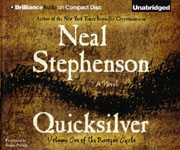 Quicksilver
Quicksilver
By Neal Stephenson; Read by Simon Prebble
12 CDs – Approx. 14 Hours 35 Minutes [UNABRIDGED]
Publisher: Brilliance Audio
Published: August 2010
ISBN: 9781441874962
Sample: |MP3|
Quicksilver is the story of Daniel Waterhouse, fearless thinker and conflicted Puritan, pursuing knowledge in the company of the greatest minds of Baroque-era Europe, in a chaotic world where reason wars with the bloody ambitions of the mighty, and where catastrophe, natural or otherwise, can alter the political landscape overnight.
 Quantico
Quantico
By Greg Bear; Read by Jeff Woodman
11 CDs – 13 Hours 25 Minutes [UNABRIDGED]
Publisher: BBC Audiobooks America
Published: 2007
ISBN: 9780792748441
|READ OUR REVIEW|
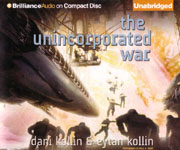 The Unincorporated War
The Unincorporated War
By Dani Kollin and Eytan Kollin; Read by Eric G. Dove
19 CDs – Approx. 22 Hours 37 Minutes [UNABRIDGED]
Publisher: Brilliance Audio
Published: May 11, 2010
ISBN: 1441858016
Sample: |MP3|
The Kollin brothers introduced their future world, and central character Justin Cord, in The Unincorporated Man. Justin created a revolution in that book, and is now exiled from Earth to the outer planets, where he is a heroic figure. The corporate society, which is headquartered on Earth and rules Venus, Mars, and the Orbital colonies, wants to destroy Justin and reclaim hegemony over the rebellious outer planets. The first interplanetary civil war begins as the military fleet of Earth attacks. Filled with battles, betrayals, and triumphs, The Unincorporated War is a full-scale space opera that catapults the focus of the earlier novel up and out into the solar system. Justin remains both a logical and passionate fighter for the principles that motivate him, and the most dangerous man alive.
 The Children Of Men
The Children Of Men
By P.D. James; Performed by John Franklyn-Robbins
9 CDs – Approx. 10.5 Hours [UNABRIDGED]
Publisher: Recorded Books
Published: 1993
ISBN: 1419323431
|READ OUR REVIEW|
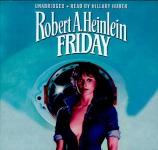 Friday
Friday
By Robert A. Heinlein; Read by Hillary Huber
11 CDs – Approx. 14 Hours [UNABRIDGED]
Publisher: Blackstone Audio
Published: 2008
ISBN: 9781433246502
Engineered from the finest genes and trained to be a secret courier in a future world, Friday operates over a near-future Earth, where chaos reigns. North America has become Balkanized into dozens of independent states, sharing only a bizarrely vulgarized culture. Now, Friday finds herself on shuttlecock assignment at the seemingly whimsical behest of her secret employer, known to her only as “Boss”. Traveling from one to another of the new states of America’s disunion, she is confronted with a series of professional as well as personal crises that put her to the test.
 A War of Gifts – An Ender Story
A War of Gifts – An Ender Story
By Orson Scott Card; Read by Scott Brick and Stefan Rudnicki
2 CDs – Approx. 2.5 Hours [UNABRIDGED]
Publisher: Macmillan Audio
Published: 2007
ISBN: 9781593976316
|READ OUR REVIEW|
Posted by Jesse Willis

